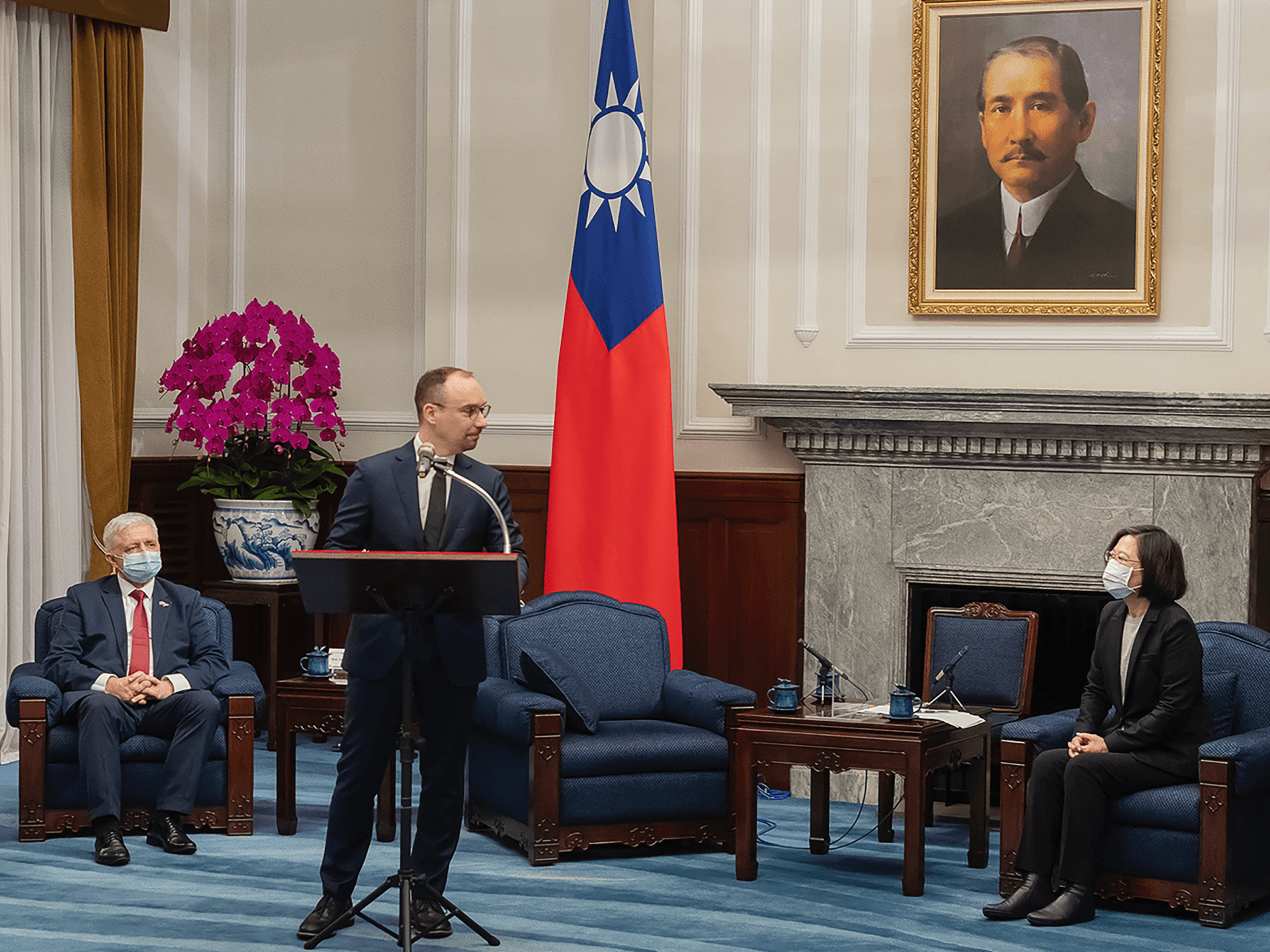Lithuania has no intention of backing down from its struggle with Communist China or its support for democratic Taiwan as it will not allow foreign authoritarians to once again decide its fate, a leading MP has told Breitbart News.
On Tuesday, Lithuanian leader Gitanas Nausėda rose eyebrows across the world by seemingly backtracking his country’s support of Taiwan against the communist regime in Beijing, taking aim at the decision of the foreign ministry to open the Taiwanese Representative Office in the capital city of Vilnius in July.
“I think it was not the opening of the Taiwanese office that was a mistake, but the name, which was not coordinated with me,” he said.
Beijing has accused Lithuania of violating the so-called ‘One China’ policy by using the word Taiwan, demanding instead that other countries only refer to Taiwan as “Chinese Taipei”.
Communist China maintains that, despite being a self-governing country since 1949, Taiwan is a part of the People’s Republic of China which merely needs to be “reunified” with the mainland. In response to the opening of the de-facto Taiwanese embassy in Vilnius, the CCP recalled its ambassador from Lithuania and downgraded diplomatic ties with the NATO state.
In an exclusive interview with Breitbart London, Matas Maldeikis MP, the chairman of the Lithuanian legislature’s Group on Parliamentary Relations with Taiwan, said that the comments from the president represented nothing more than a battle of egos between President Nausėda and Foreign Minister Gabrielius Landsbergis and will have no effect on Lithuania’s support for Taiwan.
“It has nothing to do with Taiwan, it’s a question of internal politics between the President’s office and the Ministry of Foreign Affairs. Under our constitution, both our president and the foreign minister have influence over our foreign policy and sometimes when you have two strong politicians in both seats it creates a leadership struggle. It’s not about our stance on China or our other commitments,” he explained.
Ultimately, for Lithuania confronting China is a question of national security, Maldeikis said, explaining that it is imperative for his country to stand up to authoritarianism and support democracies in order to prevent a repeat of what happened to his country last century, when it suffered under Soviet communism for decades as well as German occupation during the Second World War.
“We don’t want to get to the situation like in the 1940s where authoritarian regimes — then it was Stalin and Hitler — decide our fate behind closed doors,” he said.

In this photo released by the Taiwan Presidential Office, Taiwanese President Tsai Ing-wen, right, listens as Matas Maldeikis, head of the Lithuanian delegation, speaks during a meeting with lawmakers from Baltic states at the Presidential Office in Taipei, Taiwan on Monday, Nov. 29, 2021. (Taiwan Presidential Office via AP)
Maldeikis, who led a delegation of politicians from the Baltic States to Taiwan in November, said that Lithuania had expected the retaliatory sanctions from China after opening the de facto embassy, but said that it was surprising that the communist regime has expanded its assault to the European Union (EU) as a whole.
In an extraordinary move, China not only blocked imports from Lithuania but also imposed blockades on products produced in other EU countries made with Lithuanian parts, impacting companies in Sweden, France, and most notably Germany.
“The problem is that they are also pressing our European partners, mostly in terms of German business, which is a serious thing,” the MP said.
“About 20 years ago, Henry Kissinger said his famous phrase ‘I don’t know who to call in the European Union’. Well, it looks like the Chinese solved this riddle; they know who to call, when you need to call the EU, you talk to German business.
“It’s a big challenge for us, I won’t lie, because German business is very important for us, and we hope that our stance on China won’t impact the business relations in the EU market.”
Lithuanian MP Dovilė Šakalienė told Breitbart London that her country “does not respond well to threats… we’ve been used to threats for more than half a century (under Soviet Rule).”
“We are small but we are tough," she said.
https://t.co/Db5W0tlliV— Breitbart London (@BreitbartLondon) August 13, 2021
Under the leadership of former chancellor Angela Merkel, the German economy became deeply dependent on cheap labour from China, with top German companies such as Volkswagen, BMW, and Hugo Boss moving production to the Middle Kingdom.
All three companies, among others, have faced accusations of profiting off the backs of slave labour in the Xinjiang region of China, where it is believed that millions of Uyghurs, Kazaks, and other ethnic minorities have been interned in communist concentration camps.
Following sanctions on Lithuanian MP Dovilė Šakalienė and other European politicians in response to them accusing the communist regime of genocide in Xinjiang, the EU put a hold on a massive investment pact with China.
The deal, which was spearheaded by Merkel in 2019, sought to increase trade between the bloc and China by €120 billion. While the investment pact was put on hold, Merkel’s successor as chancellor, Olaf Scholz, in his first official conversation with Xi Jinping reportedly told the Chinese dictator that Germany will seek to rekindle the deal and has hopes that it will “take effect as soon as possible”.
Other powerful figures in Europe, such as EU President Charles Michel, have also signalled support for putting the trade pact with China back on the table.
Exclusive: We Won’t Be ‘Intimidated’ by Communist China, Says Lithuanian MP on Opening of Taiwanese Embassy https://t.co/JK3NmRlGzx
— Breitbart London (@BreitbartLondon) July 22, 2021
Mr Maldeikis downplayed the idea of the bloc allowing Germany to push through such a deal, however, saying that he finds it unlikely that in light of China’s attacks on European businesses connected to Lithuania that there will be much appetite for rewarding Beijing for its behaviour.
Indeed, the other major power player in Europe, France — which has just taken control of the rotating presidency of the EU Council — has called on Brussels to speed up the implementation of a proposed “anti-coercion instrument” to help the Lithuanian economy withstand attacks from China.
Maldeikis said that the opinion of China in capitals across the continent has deteriorated over the past five years in response to the “rapid” changes being undertaken by the regime of Xi Jinping, saying that it is “not the same country as five or ten years ago”.
“Xi Jinping has dusted off the authoritarian playbook” in response to the communist system of China failing, he said, noting that China is facing huge internal struggles brought on by the government’s socialist platform, such as the demographic collapse brought on by the one-child policy, and the government artificially propping up failing companies.
“That model doesn’t work well when you need to work with international partners, especially for international businesses, who will become frightened to remain in the country,” he said.
“I lived in a socialist society, it just doesn’t work,” Maldeikis said.
Exclusive: ‘Communism Is a Plague’ Says Lithuanian MP, as China Threatens War Over Taiwan Embassy https://t.co/zIrEx5ulCg
— Breitbart London (@BreitbartLondon) November 26, 2021
Over the past week, Lithuania has seen its support for Taiwan reciprocated, with the East Asian island nation announcing that it plans to invest $200 million into the Baltic state’s economy, much to the chagrin of Beijing.
Maldeikis said that going forward it is crucial to show the citizens of Lithuania that standing up to China is not only a moral endeavour but one that can be a “win-win situation” in terms of increased trade and bringing jobs to Lithuania.
The MP said that if Taiwan can bring prosperity to Lithuania, it will be a “crack into Europe” and open the door to more cooperation.
On top of the $200 million pledged, the Taiwan Taiwan Tobacco and Liquor Corp (TTL) announced this week that it would be purchasing 20,000 bottles of Lithuanian rum that was blocked from being sent to China.
Maldeikis, who famously declared his love of Taiwanese pineapples, which faced a similar blockade from China earlier this year, said that it was news to him that Lithuania was a big producer of rum, but joked that he will need to come up with a cocktail made from Taiwanese pineapples and Lithuanian rum.
A piña colada of freedom, if you will.
The Editor of @globaltimesnews says Lithuanians don't want Taiwan's pineapples. Fake news! I am Lithuanian, I am in Taiwan and I want a pineapple 😄🍍🍍🍍 #FreedomPineapple 🍍🍍🍍 #PeoplesRepublicOfComedy #StandWithTaiwan 🇱🇹💕🇹🇼 pic.twitter.com/eX3V42DWXo
— Matas Maldeikis MP 🇱🇹 (@MatasMaldeikis) December 1, 2021
Follow Kurt Zindulka on Twitter here @KurtZindulka

COMMENTS
Please let us know if you're having issues with commenting.